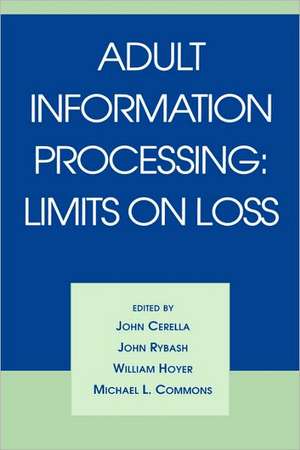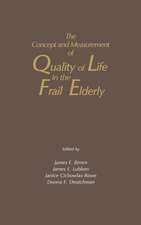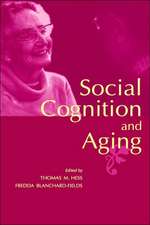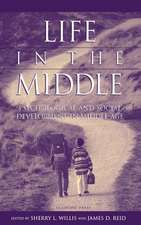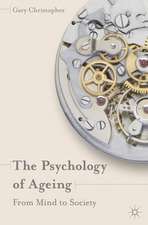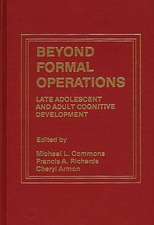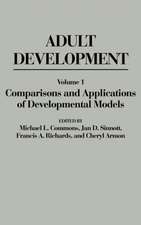Adult Information Processing: Limits on Loss
Editat de John Cerella, John Rybash, Michael L. Commons William Hoyeren Limba Engleză Hardback – 19 sep 1993
- Investigates a broad variety of information-processing tasks and capabilities
- Shows that aging adults can look forward to minimum dysfunction over a wide range of intellectual activity
- Reverses the bias toward portrayal of the aged, dysfunctional mind
- Provides information applicable toward interacting with the aged in counseling and care-giving settings
Preț: 450.07 lei
Preț vechi: 584.51 lei
-23% Nou
Puncte Express: 675
Preț estimativ în valută:
86.13€ • 89.38$ • 71.99£
86.13€ • 89.38$ • 71.99£
Carte tipărită la comandă
Livrare economică 17-31 martie
Preluare comenzi: 021 569.72.76
Specificații
ISBN-13: 9780121651800
ISBN-10: 0121651800
Pagini: 605
Dimensiuni: 152 x 229 x 34 mm
Greutate: 0.97 kg
Editura: ELSEVIER SCIENCE
ISBN-10: 0121651800
Pagini: 605
Dimensiuni: 152 x 229 x 34 mm
Greutate: 0.97 kg
Editura: ELSEVIER SCIENCE
Public țintă
Students and researchers in cognitive sciences and psychology as well as in psychotherapy/psychoanalysis, neuropsychology, social psychology, experimental psychology, gerontology, counseling, education, psycholinguistics, and neurosciences.Cuprins
Introduction:A.T. Welford, The Gerontological Balance Sheet. Neurophysiological Sparing:D.S. Woodruff-Pak, Neural Plasticity as a Substrate for Cognitive Adaptation in Adulthood and Aging. T.R. Bashore, Differential Effects of Aging on the Neurocognitive Functions Subserving Speeded Mental Processing.R. Parasuraman and P.G. Nestor, Preserved Cognitive Operations in Earl Alzheimers Disease.Information Processing Rate: J. Myersonand S. Hale, General Slowing and Age-Invariance in Cognitive Processing: The Other Side of the Coin.S.H. Johnson and J.M. Rybash, A Cognitive Neuroscience Perspective on Age-Related Slowing: Developmental Changes in the Functional Architecture.A. Baron and J. Cerella, Laboratory Tests of the Disuse Account of Cognitive Decline.T.R. Bashore and P.H. Goddard, Preservative and Restorative Effects of Aerobic Fitness on the Age-Related Slowing of Mental Processing Speed. AttentionalCapacity: B. Molander and L. Backman, Performance of a Complex Motor Skill Across the Life-Span: General Trends and Qualifications.L.M. Giambra, Sustained Attention in Older Adults: Performance and Processes.D.J. Madden and D.J. Plude, Selective Preservation of Selective Attention.Perception of Objects: N.L. Bowles, Semantic Processes that Serve Picture Naming.D.L. Schacter, J.F. Kihlstrom, A.W. Kaszniak, and M. Valdiserri, Preserved and Impaired Memory Functionsin Elderly Adults.J.C. Bartlett, Limits on Losses in Face Recognition.Word Perception:J.M. Duchek and D.A. Balota, Sparing Activation Processes in Older Adults.R. McGinchey-Berroth and W. Milberg, Preserved Semantic Memory Structure in Alzheimers Disease.Language Comprehension:P.A. Tun and A. Wingfield, Is Speech Special? Perception and Recall of Spoken Language in Complex Environments.L.L. Light, S.A. Owens, P.G. Mahoney, and D. LaVoie, Comprehension of Metaphors by Young and Older Adults.S. Kemper and C. Anagnopoulos, Adult Use of Discourse Constraints on Syntactic Processing.Learning, Memory, and Problem Solving:D.V. Howard and C.L. Wiggs, Aging and Learning: Insights from Implicitand Explicit Tests.E.A. Maylor, Minimized Prospective Memory Loss in Old Age.D.A. Walsh and D.A. Hershey, Mental Models and the Maintenance of Complex Problem-Solving Skills in Old Age. Conclusion:E. Hunt, What Do We Need to Know about Aging?Subject Index.
